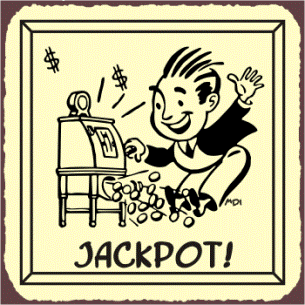The Truth behind Networked Progressive Slot Machines
Wide-Area Progressive Slots: Who pays, who profits, and do RTPs fluctuate from one casino to the next?
 It’s rare for one slot machine to be exactly like another. The themes, the returns, the features—something about each game is always different. That is, unless they are a part of what the gambling industry calls “wide-area” or “networked” progressive slot machines.
It’s rare for one slot machine to be exactly like another. The themes, the returns, the features—something about each game is always different. That is, unless they are a part of what the gambling industry calls “wide-area” or “networked” progressive slot machines.
We’ve talked about these machines before, and at length, but mostly in reference to how their jackpot grows, and how it’s won. Today, we’ll take about the back-end side of these popular games—who pays their enormous jackpots, who profits from the game play, and whether it’s possible for one player to experience a better RTP than another.
What are Networked Progressive Slot Machines?
Briefly, a networked progressive is a lot machine that carries a jackpot across a large number of machines, placed in casinos across a wide area. In land-based casinos, for example, they could be all over Las Vegas, all over the United States, or in tribal casinos all across North America.
Each game contributes to, and can release, the same jackpot prize. Being a progressive, that jackpot rises each time the reels are spun. The more machines there are on the network, and the more popular the game, the faster the progressive jackpot is likely to rise.
In land-based casinos, the Wheel of Fortune by IGT is among the most popular wide-area jackpot slots. Online, Microgaming’s Mega Moolah is the most famous.
Who Pays for Wide-Area Progressive Slots
The casinos that offer these games do not own them. They are leased by the casinos, but owned by their manufacturers. In turn, those casinos are not responsible for paying out those massive jackpot prizes, either. That task falls upon the shoulders of the games’ manufacture.
There’s little risk of them losing money, though. Aside from the jackpot seed (the amount the jackpot starts at when it’s won), it is a small percentage of each bet made that adds to the progressive jackpot prize. Players are the ones paying for it, not the casinos or the games’ creators.
Which brings us to…
Who Profits from Progressives?
Theoretically, everyone (except 99.99% of players) profits from these games. All casinos that install the networked machines will share in the money players lose. The casinos will divvy up an equal share, per machine, of all profits made on these games.
However, for obvious reasons, it’s the manufacturer that scoops the vast majority of those losses. This is only fair, since it’s the manufacturer that created the game, and the manufacturer that has to cover the cost of re-seeding the jackpot each time it’s won.
Are the RTPs Always the Same?
This is a common question, and a reasonable one. Can Casino A set the RTP for the same wide-area progressive slots game at 88%, while Casino B offers it at 85%? The answer is a resounding, “No!”
The manufacturer who is responsible for paying the jackpot gets the privilege of setting the theoretical return to player on these machines. Casinos can either take them or leave them. Even if changing the RTP were an option, one casino would never be content to let another offer the same progressive at a better payout ratio than their own.
Best Canadian Friendly iPad/Tablets Casino
 Royal Vegas Canada has been our editor’s #1 pick for three consecutive years ! Great compatibility of course (iphones, mobiles and tablets) but also an exciting range of games and promotions. Excellent support teams and quick cashouts… What else to ask for ?
Royal Vegas Canada has been our editor’s #1 pick for three consecutive years ! Great compatibility of course (iphones, mobiles and tablets) but also an exciting range of games and promotions. Excellent support teams and quick cashouts… What else to ask for ?
(Remember to gamble responsibly)


